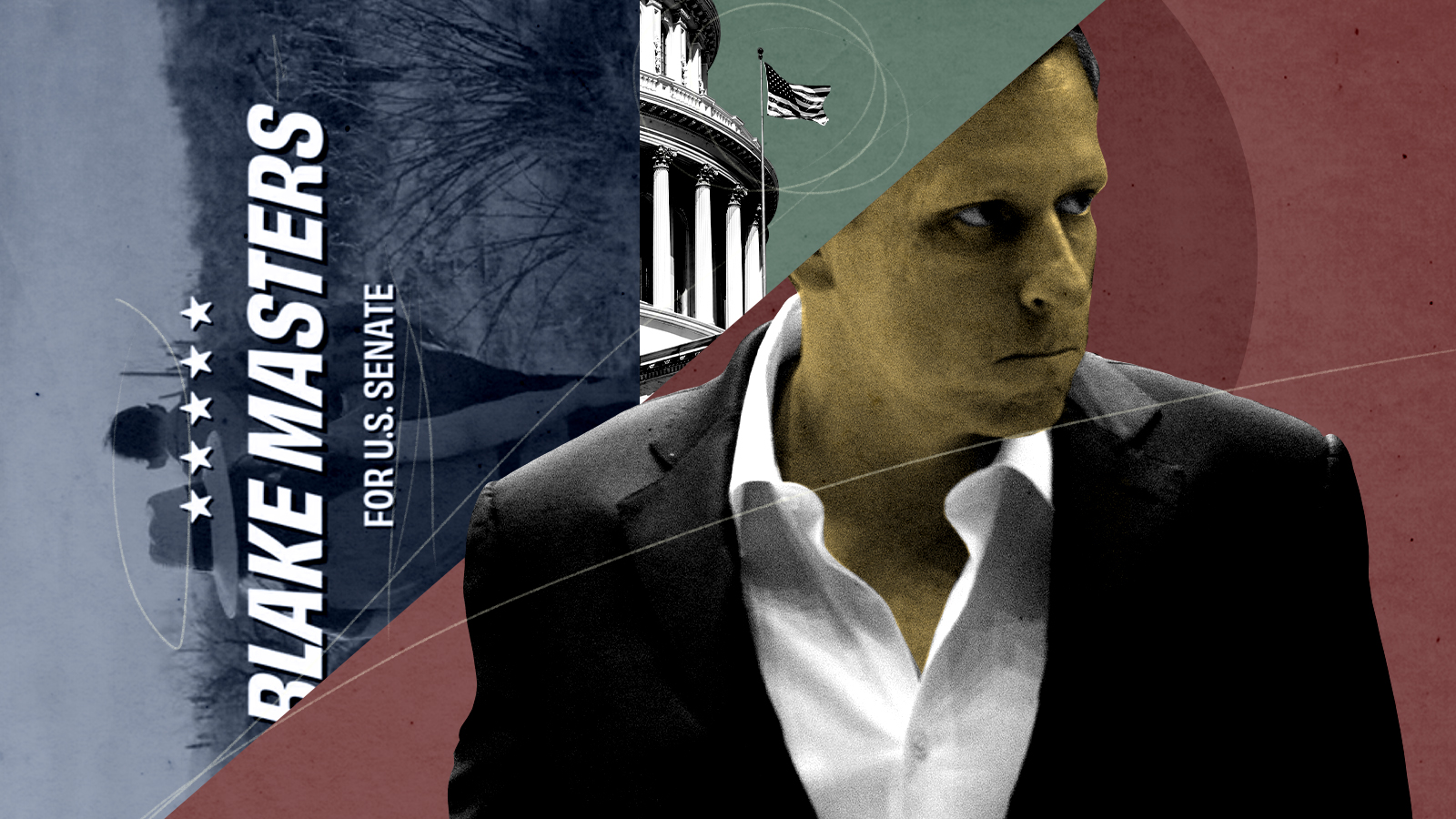Peter Thiel's implausible populists


A free daily email with the biggest news stories of the day – and the best features from TheWeek.com
You are now subscribed
Your newsletter sign-up was successful
And there were two.
Blake Masters, the chief operating officer of Thiel Capital, announced on Monday his campaign for the Republican Senate nomination in Arizona. In a video with production values reminiscent of an arthouse movie, Masters mourned the loss of American optimism and affirmed his support for patriotic education, immigration enforcement, and "an economy where you can afford to raise a family on one single income."
Masters is the second protegé of venture capitalist Peter Thiel to enter a Senate race this month. Two weeks ago, J.D. Vance — best known as author of the memoir Hillbilly Elegy — unveiled his candidacy in Ohio. Like Masters, Vance has worked closely with Thiel, who donated $10 million to his campaign, at one of the billionaire's investment firms. He too has adopted populist themes and combative rhetoric.
The Week
Escape your echo chamber. Get the facts behind the news, plus analysis from multiple perspectives.

Sign up for The Week's Free Newsletters
From our morning news briefing to a weekly Good News Newsletter, get the best of The Week delivered directly to your inbox.
From our morning news briefing to a weekly Good News Newsletter, get the best of The Week delivered directly to your inbox.
Masters and Vance have been by already been hailed by America's second most famous conservative populist. Earlier this week, Fox News' Tucker Carlson argued that they're both evidence "the Republican Party is getting better." But neither has yet received the endorsement of former President Donald Trump, which could be decisive in a crowded field. Although he recognizes the former president as "the leader of this movement," Vance struggled to explain his outspoken opposition to Trump's candidacy in 2016.
Vance's comments reflect a challenge shared by both candidates. Self-proclaimed spokesmen for ordinary Americans, both have backgrounds in elite education: Masters at Stanford, where he earned both his undergraduate and law degrees, and Vance at Yale Law. Critics of the finance and technology industries, both worked in Thiel's investment operations. Although they promise to fix broken institutions, both men are just in their mid-30s and have no previous experience in government.
Above all, Masters and Vance face the question of whether it's possible to mobilize the energies Trump unleashed without his unique charisma and extraordinary instinct for publicity. Judging by Vance's light trolling on Twitter, other candidates might be more comfortable with the carnivalesque style that Trump mastered. In his elegant campaign video, Masters presents himself as a dutiful son, loving father, and devoted citizen. It's not clear whether those virtues will be good enough for the MAGA base.
Ideological contradictions are nothing new in politics. And anyone who's not willing to play the outraged common man doesn't really want to win an American election. But can Ivy League venture capitalists with close ties to an eccentric billionaire play the role well enough to advance "Trumpism without Trump"? We'll find out.
A free daily email with the biggest news stories of the day – and the best features from TheWeek.com
Samuel Goldman is a national correspondent at TheWeek.com. He is also an associate professor of political science at George Washington University, where he is executive director of the John L. Loeb, Jr. Institute for Religious Freedom and director of the Politics & Values Program. He received his Ph.D. from Harvard and was a postdoctoral fellow in Religion, Ethics, & Politics at Princeton University. His books include God's Country: Christian Zionism in America (University of Pennsylvania Press, 2018) and After Nationalism (University of Pennsylvania Press, 2021). In addition to academic research, Goldman's writing has appeared in The New York Times, The Wall Street Journal, and many other publications.
-
 6 of the world’s most accessible destinations
6 of the world’s most accessible destinationsThe Week Recommends Experience all of Berlin, Singapore and Sydney
-
 How the FCC’s ‘equal time’ rule works
How the FCC’s ‘equal time’ rule worksIn the Spotlight The law is at the heart of the Colbert-CBS conflict
-
 What is the endgame in the DHS shutdown?
What is the endgame in the DHS shutdown?Today’s Big Question Democrats want to rein in ICE’s immigration crackdown
-
 Big-time money squabbles: the conflict over California’s proposed billionaire tax
Big-time money squabbles: the conflict over California’s proposed billionaire taxTalking Points Californians worth more than $1.1 billion would pay a one-time 5% tax
-
 Did Alex Pretti’s killing open a GOP rift on guns?
Did Alex Pretti’s killing open a GOP rift on guns?Talking Points Second Amendment groups push back on the White House narrative
-
 Washington grapples with ICE’s growing footprint — and future
Washington grapples with ICE’s growing footprint — and futureTALKING POINTS The deadly provocations of federal officers in Minnesota have put ICE back in the national spotlight
-
 Trump’s Greenland ambitions push NATO to the edge
Trump’s Greenland ambitions push NATO to the edgeTalking Points The military alliance is facing its worst-ever crisis
-
 Why is Trump threatening defense firms?
Why is Trump threatening defense firms?Talking Points CEO pay and stock buybacks will be restricted
-
 The billionaires’ wealth tax: a catastrophe for California?
The billionaires’ wealth tax: a catastrophe for California?Talking Point Peter Thiel and Larry Page preparing to change state residency
-
 Trump considers giving Ukraine a security guarantee
Trump considers giving Ukraine a security guaranteeTalking Points Zelenskyy says it is a requirement for peace. Will Putin go along?
-
 Bari Weiss’ ‘60 Minutes’ scandal is about more than one report
Bari Weiss’ ‘60 Minutes’ scandal is about more than one reportIN THE SPOTLIGHT By blocking an approved segment on a controversial prison holding US deportees in El Salvador, the editor-in-chief of CBS News has become the main story
